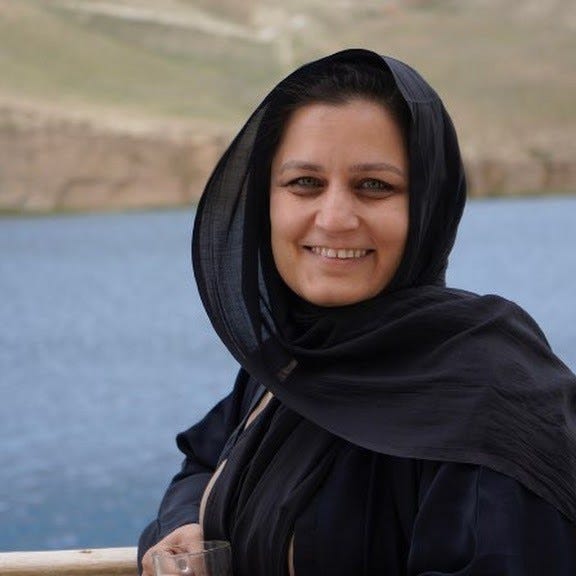An NGO Leader in Afghanistan Explains the Delicate Process of Engaging the Taliban on Women's Rights
The international community can learn from Zuhra Bahman
Ever since the fall of Kabul to the Taliban three years ago, I have periodically checked in with Zuhra Bahman, the Afghanistan Country Director for Search for Common Ground, an NGO focused on peacebuilding. When the Taliban toppled the Afghan government and asserted control in Kabul, she happened to be out of the country on a business trip. We spoke then, and she told me she was determined to return—and she did.
In our previous conversations, she explained that she felt a patriotic obligation to influence the direction of her country under Taliban rule, improve the lives of women and girls, and promote local peacebuilding efforts. After all, it’s her country, too! And she is doing her best to nudge it in a better direction by engaging directly with the Taliban.
For the most part, the international community has shunned the Taliban—and for good reason. Their policies are genuinely oppressive. But the Taliban are also here to stay; they are the de facto authorities. Since returning to Afghanistan, Zuhra Bahman has learned that there is more to gain than to lose by engaging directly with the Taliban. Through routine and mundane interactions with the authorities, she is able to secure some incremental progress. Her advice to the international community is to do the same.
Our conversation is freely available across all podcast listening platforms. Go here to access the episode on Apple Podcasts, Spotify, or wherever.
If you appreciate the interesting guests and unique global perspectives we bring to our audience, we hope you’ll support our work through a paid subscription. Immediately below the fold for our paying supporters is the transcript of this episode.
Here is an excerpt, edited for clarity. The full transcript is available immediately below the fold.
Mark Leon Goldberg: Zuhra, thank you so much for joining me again. We’ve spoken a few times over the years. I believe this is our fourth conversation for the podcast. The first time we spoke was just a few weeks after Kabul fell to the Taliban in 2021. You happened to be out of the country on a business trip, yet, at the time, you told me you were determined to return. Can you describe your thinking and motivations for coming back to Afghanistan when you could have stayed abroad?
Zuhra Bahman: It’s great to be with you again and talk and share my thoughts and experiences. Yes, I distinctly remember our first conversation. And at the time, of course, there was a lot of uncertainty — I didn’t know what was going to happen, especially for a woman who’s a professional who has been working around peacebuilding. But I am glad that I stayed. I think it’s one of the best decisions I’ve made in my life. My heart still skips a beat every time I return to Kabul from travel. Every time the plane lands into Kabul, where you’re in a valley and you enter Kabul, and in front of you, there’s the flat planes of Kabul where the metropolis is viewable. Every time I see that, I get a feel of gratitude that I decided to stay and to be here, to be of service to people around me and to myself and do the best I can.
At that time, I didn’t know what the situation was going to be like, but I’m thankful that I not only stayed to see the situation as it unfolded — but also to influence it, to try and steer the course of what was going on in my country, for myself and my peers.
Mark Leon Goldberg: You express this profound love for Kabul, for Afghanistan, which I can sense from having talked to you so many times over the years. But really it sounds like one of your motivations was to see if you could impact decisions that were being made by the new de-facto authorities, the Taliban. Have you been able to meaningfully sway some of their decision making in any discernible way? Or are you summarily dismissed for being a woman and the head of a foreign NGO?
Zuhra Bahman: The first hurdle for me, and I think for many of us, was to rethink the way the Taliban were conceptualized as individuals and a movement, and the way the Republic was conceptualized, the way civil society was conceptualized for the last 20 years. In that narrative, we were always situated against each other. And both sides the narrative relied on “othering” the opposition. For the Taliban, women that worked in NGOs, or with the foreign-backed Republic were the “other” — were the non-Afghans, were not to be trusted. And for the people and women who worked within NGOs or the government, the Taliban were “other” — they are not Afghans, they don’t have the same values as us. They don’t feel the same as us about the country, about progress. So, the first few interactions were, of course, fear, mistrust.
But then I firmly believe that the Taliban have always been a part of this country.
I don’t believe they are “other.” I do not believe they come from outside. They are, as a movement, part of this country. They’re born out of the history of this country and they belong to this country. And when you accept that, then that love and that patriotism and that desire to bring about positive change for your community extends to them.




